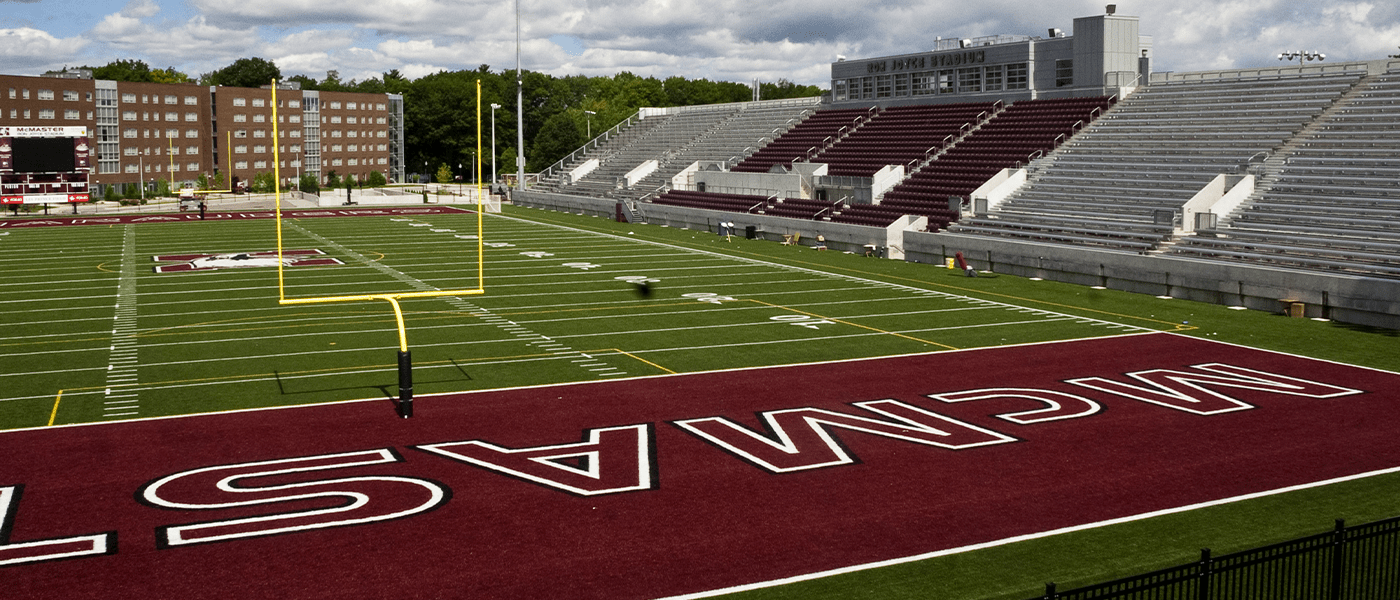‘Systemic anti-Black racism within McMaster University Athletics’ is clear, according to report
Published October 28, 2020 at 10:53 am

A review of the Black student-athlete experience at McMaster University outlines a clear culture of “systemic anti-Black racism within McMaster Athletics,” which “has existed and continues to exist.”
The report, led by Dr. Ivan Joseph, Vice-President of Student Affairs at Wilfrid Laurier University, concludes that the anti-Black culture is a result of “individual and group actions and inactions from staff, coaches, and department administrators.”
Speaking out
The review was commissioned after Fabion Foote, a defensive lineman with the Toronto Argonauts, and former Hamilton Tiger-Cats player, John Williams, took McMaster Athletics to task in July on social media based on their own experiences.
After the department posted a video in support of the Black Lives Matter movement, Foote responded:
“We still have work to do” LOL. Y’all never started sh*t to begin with. How about that? I’ve experienced a lot of systemic racism during my time at McMaster. Myself and other black student athletes brought it up and they brushed us off.”
“My friend was in a group chat were a white athlete used the N word. My teammate reported it to the coaches and they some how managed to blame us for it.”
Foote also alleges he was called a monkey by one of his coaches as other people around laughed.
Williams, meanwhile, issued a statement in support of Foote while calling out McMaster’s former director of athletics, Glen Grunwald, who is now President and CEO of Canada Basketball. Williams criticized Grunwald for his lack of action after Williams says the two met to discuss ways to support student-athletes who were visible minorities.
Williams’ complaints were corroborated, in part, by the review, which accuses departmental leaders of failing to “meaningfully address complaints or take decisive action to transform the culture.”
“It is also evident in a widespread lack of awareness, education, understanding, empathy and systemic perspective on issues of race and inclusivity.”
McMaster University response
McMaster University President David Farrar called the report “deeply disturbing.”
“On behalf of the University I apologize for the anti-Black racism you experienced. I am deeply sorry that effective action was not taken to prevent this; there are no excuses for the behaviour you endured. I assure you that we are listening and that action is already being taken to implement the report’s recommendations and to begin the work with the Department and the broader university community to help us eliminate systemic racism.”
Anti-Black systemic racism
The report contained examples and direct quotes from current and former Black student-athletes rooted in three major categories:
- Incidents and responses
- Experiences of Black football players
- Overall experiences and perspectives of Black student-athletes and coaches
There are at least 100 examples and quotes in the report:
- A non-Black McMaster alum attending a men’s basketball game and saying, “When did the team get Black overnight? That’s not the McMaster way.”
- “During my second year at McMaster, in the weight room, a [redacted] coach said to me, ‘When are you going back to Africa?’ And he laughed after he said it. I reported the incident to a coach. Nothing happened. They just went on casually.”
- “My [redacted] coach once called me King Kong or Donkey Kong. I kind of laughed it off because I didn’t know how to react, but when I got home, I cried about it because I felt like an animal. It hurt a lot because I felt weak, and I felt like I couldn’t do anything about it because this is my [redacted] coach. This is the person that determines whether or not I play.”
- “I’ll never forget, I was introduced as the Jane and Finch kid [to the crowd at a home game]. And they just really made me this charity case. Implying that I’m involved in gangs and such. A random white parent came up to me afterward and apologized to me for it being mentioned.”
- A coach indicating to a Black student-athlete that another player got playing time because he wasn’t “fully Black.”
Nonequal opportunity
The report also found that in several cases, Black football student-athletes “who felt they were held back from playing time in various ways went on to be drafted into the CFL. There were also several reports of Black student-athletes setting records for training as rookies and white rookies who did not score as well getting playing time ahead of them.”
“Sometimes, the coaches would not even tell Black athletes when a professional team had shown interest in them,” said one former player.
“For example, when the list of student-athletes that got invited to the combine came out, which is an opportunity to get drafted by the CFL, I went
to [redacted] and asked if I was invited. He said he was not sure. I had found out from other white athletes that he received the confirmation and that I was invited to the combine. They also didn’t notify [redacted] when the CFL asked about him, as well as [redacted]. They also didn’t tell [redacted] when [redacted] and [redacted] inquired about him.”
Action Plan
McMaster Athletics release an “Action Plan” in response to the review:
- Increasing representation
- A culture of accountability
- Targeted supports and scholarships
- Advocacy roles and mechanisms
- Training and education
Fabion Foote tweeted that the only way to institute change within the McMaster Athletics Department is with a change of leadership.






